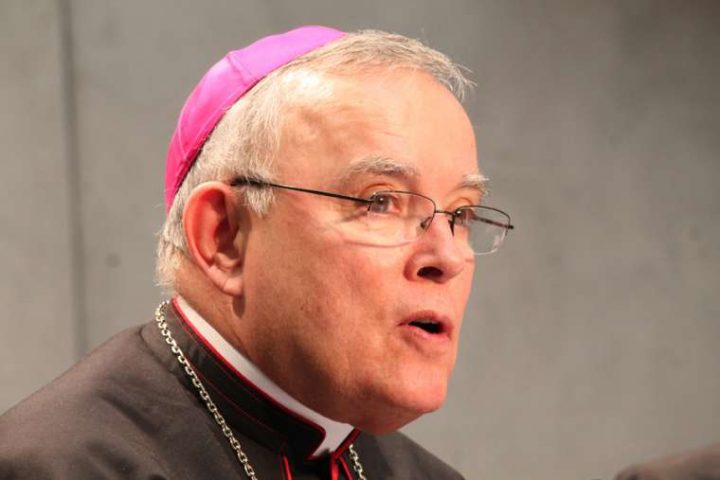Fashion Advice, Celebrity Info, and Abortion Bolstering
September 17, 2018Archives: 5 Reasons to Stay Until the End of Mass
September 17, 2018
Catholic News Agency, Sept. 14, 2018
Spokane, Wash., Sep 14, 2018 / 05:03 pm (CNA) – When man tries to cling to reason and separate himself from faith, he forgets who he is and loses his source of hope, Archbishop Charles Chaput of Philadelphia said on Friday.
Chaput gave his Sept. 14 address at the Faith and Reason Institute at Gonzaga University in Spokane, Washington, to mark the 20th anniversary of the encyclical Fides et ratio by St. John Paul II, which he recommended reading in tandem with Veritatis splendor.
Both encyclicals teach that the only way to discover the truths about man is through both faith and reason, which rely upon each other, Chaput said. Because the two are inseparable, when man loses his faith, as he is doing today, he loses much of what it means to be human.
“Today, at least in much of the developed world, theology is a backwater. Metaphysics is a museum piece. Politics, not religion, shapes our public discourse and monopolizes our zeal. The sexual revolution has crippled our institutions of marriage and family,” he said.
The catechism, he notes, has been replaced by “American advertising and entertainment.”
While there are signs of hope in regards to faith in the United States, which is still the most faithful country in the developed world, the country is also “bleeding out” when it comes to people who identify as religious, especially among the young, he said.
This hemorrhaging of faith is what makes the current scandals in the Church all the more difficult to bear, Chaput said.
“Our country and the world need a pure voice speaking the Gospel of Jesus Christ as a response. And this is what makes the current sex abuse crisis in the Church so damaging and dangerous, like a lit match in a roomful of kindling,” he said.
“The leaders tasked with witnessing Christian truth to the world as bishops and religious superiors are exactly the men who have too often failed their people, failed in their ministry, and even actively betrayed their vocation. We bishops and the Vatican itself are now seen as the problem. We need to face that fact honestly, and work to change it by our actions.”
The loss of faith also has a detrimental impact on three areas – sex, technology, and basic premises – that can shape or mis-shape society, Chaput added.
When man loses faith in God, he said, sex becomes little more than base instinct.
“Sex in today’s popular culture is mainly about impulse and desire, limited only – and sometimes not at all – by mutual consent. Rational self-mastery has little to do with it. Modesty is seen as a form of self-inflicted repression,” he said.
Technology then serves to drive the sexual revolution, which has forgotten God, Chaput said.
As for basic premises, Chaput said that America is increasingly seeking to base its morality on Enlightenment principles alone, which attempt to uphold human dignity, while cutting that dignity off from its supernatural roots.
“It doesn’t work, because it can’t work,” Chaput said.”It’s like cutting the heart out of a living creature.”
History issues dire warnings to man about what can happen when he is cut off from God and attempts to rely on reason or logic alone, Chaput noted.
“…the Jewish Holocaust was a tragedy without parallel,” Chaput said. “But it did have a precedent; a kind of test run.”
That test run was in the 1930s, when the Third Reich ordered the euthanization of more than 300,000 people with mental and physical disabilities. It was promoted as the “merciful” thing to do, Chaput said.
“Many of the victims were children, ages 6-15. The excuses given were legion: saving patients from their suffering; cleansing the Aryan gene pool; reducing the financial burden of unproductive citizens on the life of the community. Many patients were killed by injection. Some were starved. Others were gassed as groups in holding rooms or mobile ‘treatment’ vans,” he said.
Many of the targeted patients were housed in religious facilities, but only a few religious leaders, such as Bishop Clemens August Graf von Galen of Munster, spoke out against the program.
But part of the reason the program was so successful was because German doctors had started abandoning faith principles in favor of utility-based morality several decades prior, Chaput noted.
“Doctors, not the Third Reich, first pressed for euthanasia as national policy. What occurred among medical experts, in the words of one German psychiatrist, was ‘a change in the concept of humanity,’ with its perfectly logical consequences. Sentimental words about human dignity, unmoored from some authority or purpose higher than ourselves, were just that – words.”
Only through faith in God, who is love, can man overcome the brutal ends toward which a society based on reason alone leads.
“The genius of Fides et Ratio, the beauty and the glory of the text, is its defense of the capacity of human reason to know the truth; a truth rooted in the deep harmony of creation,” Chaput said.
“The world has a logic and meaning breathed into it by its Author, who is Love himself. And reason lit by faith can see that, and find the path to him.”
“Despite all the crises in the Church, despite all the failures and sins of her leaders, despite all our distractions and weaknesses and indifference as a people, God guides the world,” Chaput added.
“He informs and sustains it with his Love. In seeking that love, and finding it, and living it with all our mind and heart – therein lies our joy. Therein lies our hope.”




